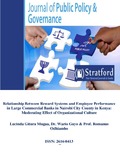| dc.contributor.author | Mugaa, Lucinda Gitura | |
| dc.contributor.author | Guyo, Wario | |
| dc.contributor.author | Otieno, Romanus Odhiambo | |
| dc.date.accessioned | 2018-11-26T07:06:21Z | |
| dc.date.accessioned | 2020-02-07T08:38:26Z | |
| dc.date.available | 2018-11-26T07:06:21Z | |
| dc.date.available | 2020-02-07T08:38:26Z | |
| dc.date.issued | 2018 | |
| dc.identifier.citation | Mugaa, L. G., Guyo, W., & Odhiambo, R. (2018). Relationship Between Reward Systems and Employee Performance in Large Commercial Banks in Nairobi City County in Kenya: Moderating Effect of Organizational Culture. Journal of Public Policy & Governance, 2(1), 60-79. | en_US |
| dc.identifier.uri | file:///C:/Users/User/Downloads/148-Article%20Text-396-2-10-20180524.pdf | |
| dc.identifier.uri | http://repository.must.ac.ke/handle/123456789/1254 | |
| dc.description.abstract | Organizational culture has been considered as critical aspect to organizations. Organizational culture has a pervasive effect on an organization because it defines who its relevant employees, customers, suppliers, and competitors are, and how to interact with these key actors. The study sought to establish the moderating effect of organizational culture on the relationship between reward systems and employee performance in large Commercial Banks in Nairobi City County in
Kenya. The reward systems included financial rewards, fringe benefits, recognition schemes and career progression. Cognitive Consistency Theory was used to inform the study. The study adopted a descriptive research design. Descriptive statistics was chosen since it utilizes data collection and analysis techniques that yield reports concerning the measures of central tendency, variation, and correlation. The combination of its characteristic summary and correlation statistics, along with its focus on specific types of research questions, methods, and outcomes necessitated the choice of this design. The study adopted a positivism philosophy. The target population was 22,856 employees working in the six selected Commercial Banks in Nairobi City County composed of both clericals and Management staff. Krejcie and Morgan sample size determination table was used to derive a sample of 377 respondents. Primary data was collected using structured questionnaires that had both close ended and open-ended questionnaires. Quantitative data were analyzed using SPSS. Test of hypothesis was done at 95% confidence interval. The study found out that Organizational culture was a significant moderating variable for financial reward 0.02<0.05 and recognition schemes at 0.02<0.05. However, organizational culture did not have a significant moderating effect on fringe benefits 0.24>0.05 and career progression 0.32>0.05. The
study recommends policy makers should come up with the policies that supports the culture of involving all employees and stakeholders since organizational culture since it has ability to shape organization’s capacity for and receptiveness to change as well as the ability to shape the speed and efficiency with which things are done. | en_US |
| dc.language.iso | en | en_US |
| dc.publisher | Journal of Public Policy & Governance | en_US |
| dc.subject | Reward Systems, Organizational Culture, Employee Performance, Commercial Banks & Nairobi City County, Kenya. | en_US |
| dc.title | Relationship Between Reward Systems and Employee Performance in Large Commercial Banks in Nairobi City County in Kenya: Moderating Effect of Organizational Culture | en_US |
| dc.type | Article | en_US |

